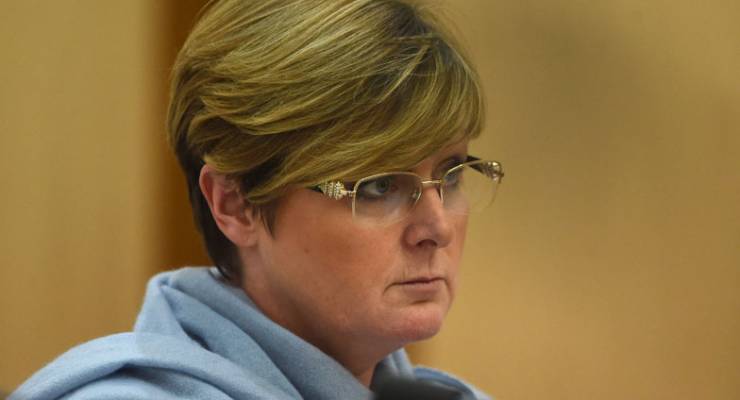
When Solicitor-General Justin Gleeson appeared before the Senate’s Legal and Constitutional Affairs committee inquiry into George Brandis’ direction about access to him, his main harassers on the committee were two of Brandis’ LNP colleagues, Ian Macdonald and Barry O’Sullivan. Western Australian Liberal Linda Reynolds also tried to get her licks in, but she struggled to make an impression between the sheer rudeness and abuse leveled at Gleeson by Macdonald and O’Sullivan.
But not to be outdone, Reynolds — once chief of staff to Liberal nonentity Chris Ellison — decided to go on with the stoush after it was over, placing a whopping 120 questions on notice to Gleeson, a kind of paper denial of service attack on the now outgoing Solicitor-General. Placing questions on notice is the usual way of asking questions of witnesses that you run out of time to ask at a hearing, but Reynolds ignored that and decided her questions would be entirely about what Gleeson had said at the hearing but that she hadn’t had the knowledge or wit (or emails from Brandis’ office to her laptop in the committee room) to ask at the time.
And as has now been reported, Gleeson told her to stick her questions, an approach endorsed by the committee’s chair, WA Labor Senator Louise Pratt.
But what exactly did Reynolds ask? There are at least three sub-categories in the many pages of closely typed questions. There are the abusive ones, such as questions about why Gleeson uses the post-nominal “SC” — “why do you use that post-nominal … even though, as Solicitor-General, you do not practice as a barrister?” Reynolds might, given the circumstances around Brandis’ own “SC” and the fact that he hasn’t practised for far longer than Gleeson, want to be a bit careful on that one. Or there’s her demand to know what “journalists, publishers or commentators” Gleeson had spoken to about confidential advice.
Then there are the time wasters, designed to force Gleeson to spend hours going through files and case law — “What is the precise content and source of your duty to the Commonwealth of Australia?” (actually, she asked that twice) — and questions about the nature of legal privilege, or a question about the history of Governors-General seeking advice from the Solicitor-General. And then there are questions that Reynolds herself is actually, as a member of the committee, best placed to answer. “Were you compelled to give evidence or present documents to the committee? Did the Committee or its secretariat ask you or any member of your staff whether you consented to the publication of your submission on the internet?” (again, she asked that twice)
Maybe pick up the phone and ask your committee secretary, senator? After all, they work for you. Or you could ask your colleague Brandis about his response to questions from Gleeson, rather than asking Gleeson to tell you what Brandis said. Better yet, you could have asked these questions of Gleeson at the time when he was right in front of you. It all seems like what Brandis, who likes a French phrase or two, might say was a severe case of l‘esprit d’escalier.








Brandis’ lynch mob mentality.
Reynolds appears to fit the current Liberal profile effortlessly. A natural.
bit hard to claim Gleeson was disrespectful of convention when this idiot and idiot MacDonald act like disrespectful (and ignorant) attack dogs
Reynolds seems typical of those puffed up Senators who feel that a good kicking to someone who can’t defend themselves restores their self esteem – temporarily at least. We’ve seen it before with the likes of Bishop (B), Fierra-whatshername, and others. I hope Gleeson prospers after this episode and Reynolds remains just another blot on democracy.
Another charmless non-entity. Is there a factory where they make these awful people?
Good question Mr Denmore. In my first 30 years I met very few people like this, now they seem to be everywhere. Most noticeable by their discernible by their lack of intellect, skills or charm, and an overweening sense of self-importance.
What happened to humanity? When did psychopaths become the norm?
In the army apparently
or the LNP?
Yes in they are spawned in the LNP urinal.
What a complete F***wit.
Yes, the LNP.